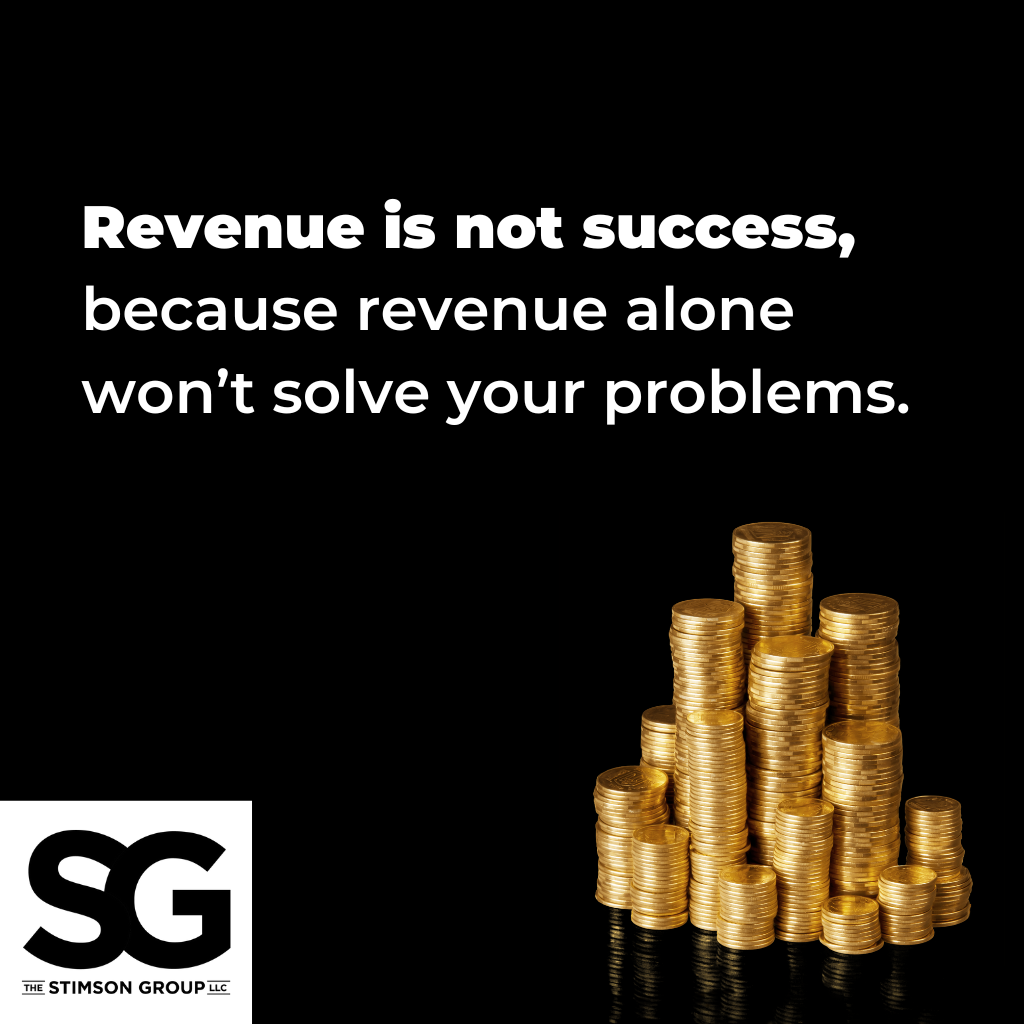
Listen instead on your Monday Morning Drive:
Owners often come to me concerned about their sales teams.
They say, “We’re not getting enough new business,” “There are gaps in our calendar,” or simply, “My sales team isn’t successful.” When I dig a little deeper and ask how they define success in sales, 99% of the time, the answer is revenue.
But revenue is not success, because revenue alone won’t solve your problems. True success in sales is defined by the quality of the conversations your sales team has with prospects, not the quantity of deals closed.
If your salespeople are talking to the right people, any deal they close will be a good deal. But if they’re not, there’s a real risk of closing poor deals that hurt your business.
What Is NOT Success in Sales?
It’s tempting to focus solely on revenue as the key metric for sales success. But for most companies, revenue is just a vanity number. What really matters is the quality of that revenue.
To get high-quality revenue, you need to have high-quality conversations with high-quality prospects.
I once hired a salesperson who had been very successful in his previous career. But when he came to work for me, he felt pressured to close deals quickly to prove himself. He started chasing any deal he could close, including a low-value deal for an $800 job 90 minutes away. I tried to coach him to talk to the right people rather than just closing any deal, but it was a tough mindset shift.
Another trap is equating being busy with being successful. Your sales team might send out lots of quotes, have tons of conversations, and spend time helping other departments. They’ll say they’re “really busy right now,” but in reality, they’re just permitting themselves to not be successful.
What IS Success in Sales?
Real sales success is doing quality work for the right people at a fair margin. In an ideal world, you do fantastic work for the best clients at incredible margins, but even good work for the right clients at fair margins is success in my book.
To achieve this, you need access to the right people — the people who need you. And to get access to the people who need you, you need to have the right conversations. If the right people aren’t finding you, you won’t get the right revenue.
So, focus on attracting your ideal clients. Then you can convert them into profitable business.

Identifying Your Ideal Customer
What qualities does your target customer have? What’s their role? What do they value? What’s their relationship with money? What’s truly important to them?
If you’re not crystal clear on who you’re trying to reach, you’ll either attract the wrong people or scare off the right ones. Casting too wide a net with your marketing will make ideal clients think you’re trying to be too many things to too many people. They won’t see themselves as your top priority.
To avoid scaring off the right people, focus your efforts on scaring off the wrong people. Get clear on who you serve best and tailor your marketing to attract them. My marketing book, Demand, explains how to do this in detail.
Never a Wasted Conversation
One pushback I often hear is, “What if I’m talking to the right person at the wrong time?”
An ideal client might want to get to know you better before bringing you an opportunity. But if your sales team is too focused on immediate revenue, they’ll write off these promising leads.
There’s no such thing as a wasted conversation with the right person. Even if the right person isn’t ready to buy just yet, any conversation with them lays the groundwork for future business. It’s far more valuable to give an ideal prospect the time and attention they deserve than to chase a bad-fit client for a quick sale.
Sales Success Is Never-Ending
Selling is a never-ending process because it encompasses ALL aspects of generating sales: marketing, business development, design, estimation, budgeting, proposals, and account management. All these facets need constant attention and energy.
As soon as you neglect any part of the sales process, your pipeline of ideal clients runs dry. You’ll have fewer of the right conversations with the right people. And that will inevitably lead to settling for lower-quality revenue.

Keys to Training Your Sales Team
To ingrain this approach in your sales team, focus training and development on the three keys to effective sales:
- Identify your target buyer. Make sure your team knows exactly who your ideal clients are. Do your marketing efforts attract the right people? Do your prospects come to you ready to learn more?
- Develop listening skills. When ideal leads come in, does your team pounce on them with an overwhelming flood of information, or do they take the time to truly listen and understand the prospect’s needs and challenges? Patience and insightful questions are key.
- Solve problems carefully. It doesn’t matter how amazing your process or methodology is if it’s not solving the right problems. Not every ideal client needs exactly what you’re selling. Your team needs to articulate the end results you provide in a way that resonates.
Not every perfect-fit prospect will become a client. But by making it clear that you understand them, hear them, and can help them achieve their goals, you’ll win far more than you lose. And those will be the right wins for your business.





Leave a Reply